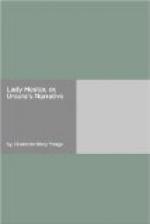How well I remember that last evening! I was happier than I had been for weeks about little Alured: the convulsions had quite gone off, the teeth that had caused them were through, and he had been laughing and playing on my lap quite brightly—cooing to his mother’s miniature in my locket. He was such an intelligent little fellow for eighteen months! I came down so glad, and it was so pleasant to see Emily, in her white dress, leaning over my father while he had gone so happily into his old delight of showing his prints and engravings; and Torwood, standing by the fire, watching them with the look of a conqueror, and Jaquetta—like the absurd child she loved to be— teasing them with ridiculous questions about their housekeeping.
They were to have Spinney Lawn bought for them, just a mile away, and the business was in hand. Jaquey was enquiring whether there was a parlour for The Cid, Torwood’s hunter, whom she declared was as dear to him as Emily herself. Indeed, Emily did go out every morning after breakfast to feed him with bread. I can see her now on Torwood’s arm, with big Rollo and little Malta rolling over one another after them.
Then came an afternoon when we had all walked to Spinney Lawn, laid out the gardens together, and wandered about the empty rooms, planning for them. The birds were singing in the March sunshine, and the tomtits were calling “peter” in the trees, and Jaquetta went racing about after the dogs, like a thing of seven years old, instead of seventeen. And Torwood was cutting out a root of primroses, leaves and all, for Emily, when we saw a fly go along the lane, and wondered, with a sort of idle wonder. We supposed it must be visitors for the parsonage, and so we strolled home, looking for violets by the way, and Jaquetta getting shiny studs of celandine. Ah! I remember those glistening stars were all closed before we came back.
Well, it must come, so it is silly to linger! There stood the fly at the hall-door, and the butler met us, saying—
“There’s a person with his lordship, my lord. She would not wait till you came in, though I told her he saw no one on business without you—”
Torwood hastened on before this, expecting to see some importunate person bothering my father with a petition. What he did see was my father leaning back in his chair, with a white, confounded, bewildered look, and a woman, with a child on her lap, opposite. Her back was to the door, and Torwood’s first impression was that she was a well-dressed impostor threatening him; so he came quickly to my father’s side, and said—
“What is it father? I’m here.”
My poor father put out his hand feebly to him, and said—
“It is all true, Torwood. God forgive me; I did not know it!”
“Know what?” he asked anxiously. “What is it that distresses you, father? Let me speak to this person—”
Then she broke out—not loud, not coarsely, but very determinately— “No, sir; you would be very glad to suppress me, and my child, and my evidence, no doubt; but the Earl of Trevorsham has acknowledged the truth of my claim, and I will not leave this spot till he has acknowledged my mother as his only lawful wife, and my child, Trevor Lea, as his only lawful heir!”




